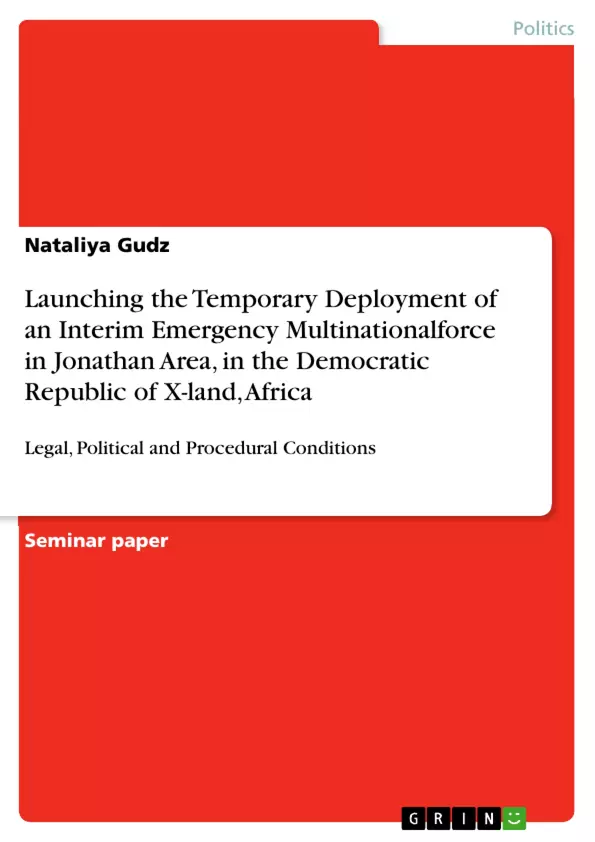On 02 November 2003, the United Nations Security Council unanimously adopted Resolution 1464/02 (2003) authorising under Chapter VII of the UN Charter, the temporary deployment of an interim emergency multinational force in Jonathan Area, in the Democratic Republic of X-land, Africa. Referring to the request of the High Representative for CFSP, General Secretary Xavier Solana, the Political Planning Unit has prepared a background-paper to be submitted for the Council's discussion and decision on the Secretary-General's request.
The following background paper covers the two main questions to be answered:
1. Should the European Union decide to provide a temporary stabilisation force in the Jonathan Area?
2. What are the legal, political and procedural conditions to take the relevant decision on the launching of the European Union military operation in the Democratic Republic of X-land?
The European Union is a newcomer in the business of military and peace support operations. However, it is true that its member states have long been involved in almost any sort of any - Article 5 (NATO/WEU) or Chapter VI-VII (UNO) mission in the past, and they are still today. Yet they have normally done so under other flags than the EU's proper.
Inhaltsverzeichnis (Table of Contents)
- Legal conditions
- Political conditions
- Procedural conditions
- Additional conditions and prerequisites
Zielsetzung und Themenschwerpunkte (Objectives and Key Themes)
This background paper examines the legal, political, and procedural conditions for the European Union (EU) to launch a temporary military intervention in Jonathan Area, in the Democratic Republic of X-land, Africa. It specifically addresses the question of whether the EU should provide a stabilisation force and the necessary steps to implement such an operation.
- The legal framework for EU military operations, including the Treaty on European Union and UN Security Council resolutions.
- The political context and the EU's evolving role in crisis management.
- The procedural requirements for launching and coordinating EU-led military interventions.
- The importance of cooperation with third states and the role of framework nations.
- The need to secure a legal framework for the EU forces in the host country.
Zusammenfassung der Kapitel (Chapter Summaries)
- Legal conditions: This section outlines the relevant legal framework for the EU's military intervention, including the Treaty on European Union, UN Security Council Resolution 1464/02 (2003), and relevant X-land legislation.
- Political conditions: This section focuses on the political considerations for the operation, including the mandate outlined in the UN Security Council resolution, the Framework Nation Concept, and the need for political control and strategic direction by the Political and Security Committee (PSC).
- Procedural conditions: This section details the procedural steps involved in launching the operation, such as the appointment of an Operation Commander and a Force Commander, and the need for coordination with third states and the host country.
Schlüsselwörter (Keywords)
The key themes and concepts covered in this background paper include the EU's evolving security and defence policy, the legal framework for military operations, the role of the UN Security Council, political control and strategic direction, the Framework Nation Concept, and the importance of international cooperation in crisis management.
Frequently Asked Questions
What is the legal basis for the EU intervention in Jonathan Area?
The intervention is authorized under Chapter VII of the UN Charter via UN Security Council Resolution 1464/02 (2003) and the Treaty on European Union.
What is the "Framework Nation Concept"?
The Framework Nation Concept refers to a lead nation providing the core of the military force and command structure for an EU-led operation, facilitating rapid deployment.
Who exercises political control over the EU military operation?
Political control and strategic direction are exercised by the Political and Security Committee (PSC) of the European Union.
Why is cooperation with the host country essential?
Cooperation is necessary to establish a legal framework for EU forces within the host country and to ensure the operation meets its stabilization goals effectively.
Which UN Security Council resolution authorized this deployment?
The temporary deployment was authorized by Resolution 1464/02, adopted in 2003.
- Quote paper
- Nataliya Gudz (Author), 2004, Launching the Temporary Deployment of an Interim Emergency Multinationalforce in Jonathan Area, in the Democratic Republic of X-land, Africa, Munich, GRIN Verlag, https://www.grin.com/document/24819



